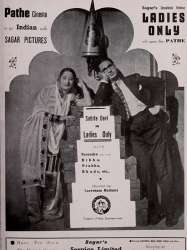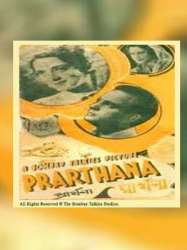Sabita Devi est un Acteur né le 1 janvier 1914

Sabita Devi (1914–1965) was a Hindi film actress in Indian cinema. She is stated to be one of the "prominent" leading ladies of the "pioneering era" of Indian cinema along with Mehtab, Bibbo, Durga Khote, Gohar , Devika Rani and Seeta Devi. A Jew by birth, she changed her name to find acceptability in Hindi cinema like the other Anglo-Indian and Jewish actresses of her time, Sulochana (Ruby Myers), Seeta Devi (Renee Smith), Madhuri (Beryl Claessen), and Manorama (Winnie Stewart). After initially working with British Dominion Films Ltd., Calcutta, she shifted to Bombay and performed mainly in films produced by Sagar Movietone with her co-star in most films being Motilal. Some of the popular films with Motilal were Dr. Madhurika (1935) and Kulvadhu (1937) directed by Sarvottam Badami. Their first film together was Shaher Ka Jadoo (1934), which was also Motilal's debut film, and then Lagna Bandhan (1936) both directed by Kaliprasad Ghosh. She acted in Silver King (1935) with Motilal. It was an action film directed by C. M. Luhar, which became a "huge success".
Counted as one of the top three female artistes of her time, in 1938 she was the third highest paid actress after Sulochana (Ruby Myers) and Gohar, drawing a salary of Rs. 3000 per month. "Classic writers like K. M. Munshi and Ramanlal Vasantlal" were commissioned to write stories for her films, with elaborate sets and "special rehearsals" provided along with an overwhelming "pre-release publicity". One of the top directors of the time she worked with doing social genre films was Sarvottam Badami. She formed her own production company, Sudama Pictures, in collaboration with Sarvottam Badami along with the assistance of Ranjit Studios. From 1935–1943 Sabita acted in fifteen films, all directed by Badami. Some of the comedy films she acted in like Aap Ki Marzi (1939) and Ladies Only (1939), turned out to be big box-office successes.
Source : Wikidata
Sabita Devi

- Infos
- Photos
- Meilleurs films
- Famille
- Personnages
- Récompenses
Nom de naissance Iris Gasper
Naissance 1 janvier 1914
Mort 1 janvier 1965 (à 51 ans)
Naissance 1 janvier 1914
Mort 1 janvier 1965 (à 51 ans)
Counted as one of the top three female artistes of her time, in 1938 she was the third highest paid actress after Sulochana (Ruby Myers) and Gohar, drawing a salary of Rs. 3000 per month. "Classic writers like K. M. Munshi and Ramanlal Vasantlal" were commissioned to write stories for her films, with elaborate sets and "special rehearsals" provided along with an overwhelming "pre-release publicity". One of the top directors of the time she worked with doing social genre films was Sarvottam Badami. She formed her own production company, Sudama Pictures, in collaboration with Sarvottam Badami along with the assistance of Ranjit Studios. From 1935–1943 Sabita acted in fifteen films, all directed by Badami. Some of the comedy films she acted in like Aap Ki Marzi (1939) and Ladies Only (1939), turned out to be big box-office successes.
Le plus souvent avec
Filmographie de Sabita Devi (16 films)
Acteur

Manmani (1946)
Acteurs Paidi Jairaj, Nazir Hussain, Sabita Devi
Manohar, a wealthy young man and Shashi, a young city girl are good friends. They argue about who is a bigger spendthrift, man or woman. Manohar decides to prove that it's the female and for that he finds a young village girl Tara, who he decides to use as an experiment. Tara resides in the village with her father, but agrees to go to the city With Manohar to get photographed. In the city she lives with Manohar and he starts grooming her into a perfect lady. She learns the ways and then decides to go to see her father in the village. Manohar has fallen in love with Tara but is unable to tell Shashi, who also loves him. When the villagers taunt Tara for staying alone with a young man in the city, she lets them know that she and Manohar are getting married. She returns to the city with her father, only to find Manohar showing slides of the different stages of development in Tara's grooming to a group of people. Misunderstandings arise only to be sorted out finally when Manohar explains.

Chingari (1939)
Acteurs Prithviraj Kapoor, Sabita Devi
Geeta, lives with her brother, who is financially too poor to support her. She is married, but leads a lonely life, as her father-in-law turns her out of the family house stating that her mother had a bad name in society. Her husband, Biren, now wants a reconciliation. The father-in-law is dead, as also is Biren's other wife through whom he has a son, Charan. Geeta initially is angrily opposed to any patch up but Charan's subsequent illness brings the couple together.

Ladies Only (1938)
, 2h38Acteurs Sabita Devi, Surendra, Bibbo
Three girls from different regions of India, Sabita Devi (Gujarat), Bibbo (Punjab) and Prabha (Bengal) meet at a railway station. With no place to stay they decide to find accommodation together. A cook (Bhudo Advani) joins them speaking the language from each state. A young crook (Surendra) enters their life and trouble starts brewing between the girls when they all fall in love with him.

Teen Sau Din Ke Baad (1938)
, 2h38Genres Aventure
Acteurs Motilal, Yakub, Sabita Devi, Bibbo
Rôle Sharda
Sudhir (Motilal), a young millionaire is leading a dissipated life indulging in drinks, gambling and women due to sheer boredom. His health starts fading and after one such bout he faints. The doctor admonishes him regarding his life-style. He advises him against his fast life and suggests that he take to some physical labour, which the doctor is sure Sudhir will not be able to do. Sudhir takes up the challenge and decides to give up his home for three hundred days and live without using his wealth. He sets out into the world with nothing in his pocket. The challenges he faces and how he overcomes them are interspersed with a lot of humour and hard work as he tries to make a living. He finally ends up working in a soap factory where he falls in love with the typist Sharda (Sabita Devi). The boss Lakshmidas has a wife Ramola (Bibbo), who is attracted to Sudhir. When the boss faces problems with the factory, Sudhir anonymously sends money to help him out. Eventually the three hundred days are over, Sudhir now a healthy young man has won his bet with the doctor and a wife for himself.

Aap Ki Marzi (1938)
Acteurs Motilal, Khursheed Bano, K. N. Singh (Krishan Niranjan Singh), Sabita Devi
Rôle Shashi
Seth Bansilal (Mazhar Khan) posing as an ordinary man Govindlal, takes part in a crossword puzzle competition; he wins the second-prize trip to Kashmir. The first prize is won by an unemployed youth, Sumant (Motilal). Bansilal, accompanied by his niece Shashi (Sabita Devi), lands up at a hotel in Kashmir at the same time as Sumant. Due to some misunderstanding Sumant gets the room Bansilal's wife (Sunalini Devi) has booked for him. Bansilal opts to stay in a common cheaper room as Govindlal. Several comic situations follow along with Sumant and Shashi falling in love and Sumant getting black-mailed by a girl in the hotel, Manjri (Khursheed). The misunderstandings are finally cleared with the lovers getting united.

Grama Kanya (1935)
, 2h17Acteurs Yakub, Sabita Devi, Surendra
Rôle Bansari
Kumar (Surendra ) comes to the city from his village to study in college. His father has been sanctioned a loan from the rich Dinanath (Kayam Ali) to enable Kumar to study. Dinanath gives the loan on the basis of Kumar getting married to his daughter Bansari (Sabita Devi). Kumar is in love with another girl Vilas (Aruna), and wants to marry her. Parental obligations and duty make him forgo Vilas who is pregnant and get married to Bansari. The story continues with the accidental killing of his father by Kumar, and Vilas' narrative from thereon.

Dr. Madhurika (1934)
, 2h54Acteurs Motilal, Sabita Devi
Rôle Dr. Madhurika
Dr. Madhurika (Sabita Devi) is a "modern" young woman, committed to her career and believes in family planning. She marries Narendra (Motilal), but first makes him agree to not wanting children as a way of controlling population growth. She would also prefer that he not interfere in her work or stop her from meeting friends. She becomes friendly with one of her doctor colleagues, Dr Gaurish (Pesi Patel), but when she sees Narendra paying attention to Gaurish's wife her jealousy is aroused. She then turns into a typical housewife of whom her husband can be proud.

Grihalaxmi (1933)
Acteurs Yakub, Krishna Chandra Dey, Sabita Devi, Mehboob Khan
Rôle Malti
Malti (Sabita Devi) is the daughter of a wealthy mill-owner Jagmohandas (Asooji), who is an evil, corrupt man. She meets a young man Vinod (Jal Merchant) in College. They both fall in love and decide to get married. However, Vinod's father is humiliated by Jagmohandas and he commits suicide. An angry Vinod decides to take revenge by marrying Malti and putting her through mental and physical abuse. An old friend of Malti's, Sudhakar (Balaram), loves her from college days and watches the treatment Malti suffers through her husband but is unable to do anything. Vinod takes to drinking and bringing nautch girls home. Malti suggests Sudhakar get married to Nalini (Swaroop Rani) who is ultra-mod but Malti tries to help her turn traditional.
 Connexion
Connexion






